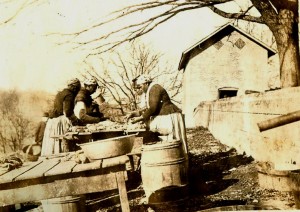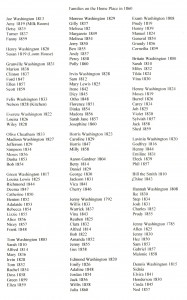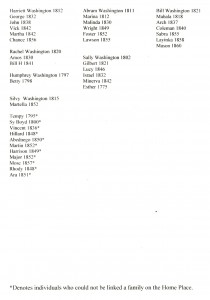Enslaved African American women performed various task on southern plantations and farms. Women on Wessyngton Plantation were not required to do any hard labor in the fields as the men did; however, they were an important part of other operations on the plantation. Women did light work in the gardens, they knitted and sewed for the slave community and their owners, worked the looms, and did the spinning and weaving. They were responsible for cooking, cleaning, washing, ironing, making cheese, preserves, and soap. No mother with a young baby was expected to do any outside work until her baby was two years old. There was a nursery on the plantation were children were cared for by elderly women too old to work. Women were a vital part of the pork processing industry on the plantation as seen in the photo above. Each week the women on the plantation would assemble at the plantation smokehouse (building in background of photo) and would be allotted bacon, meal, flour, sugar, and coffee based on the number of individuals in their families. Hundreds of hogs were killed at each year at Wessyngton to feed the enslaved population and the Washington family. Wessyngton had a reputation for producing its famous Washington Hams which could be found on the menus of the finest restaurants as far south as New Orleans and as far north as Philadelphia.
Posts Tagged ‘Slave Women’
Slave Women on Southern Plantations
Friday, October 9th, 2009Enslaved African American Families on Wessyngton Plantation in 1860
Sunday, July 12th, 2009
In 1860 Wessyngton Plantation was the largest tobacco plantation in the United States. The Washington family also held the largest number of enslaved African Americans (274) in the state of Tennessee. 187 of them were held on what was called the “Home Place” near the Wessyngton mansion. Eighty-seven others were held on a part of the plantation known was the “Dortch Place.”


